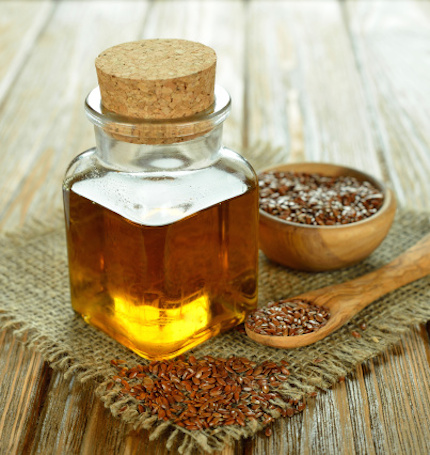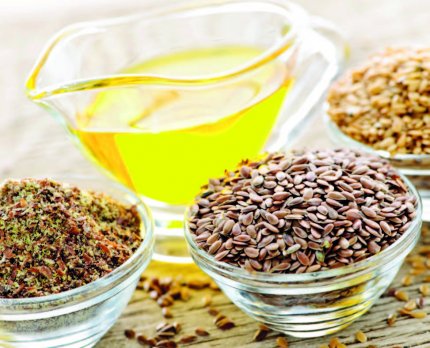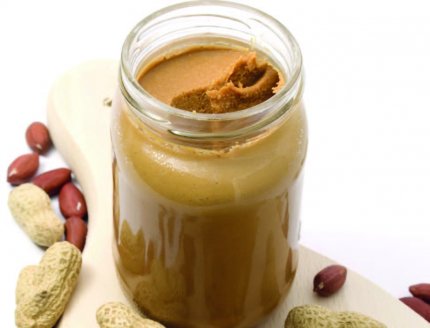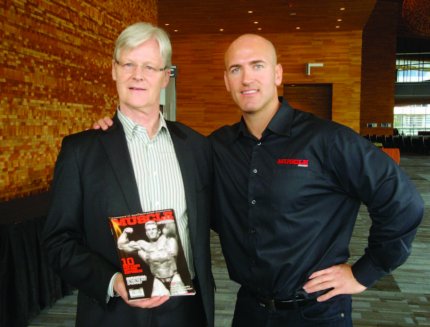One-on-One With Dr. Udo Erasmus

THE FAT DOCTOR SPEAKS!
Dr. Udo Erasmus reveals why choosing the right blend of dietary fats can fuel your muscular development and strength.
Starting in the mid-1980s, Dr. Udo Erasmus pioneered the use of flax oil through an exhaustive itinerary of public lectures and TV and radio interviews. His groundbreaking book Fats That Heal, Fats That Kill became the industry’s encyclopedia on healthy fats and performance. Dr. Erasmus’s commitment to the field of fats and oils has led to the countless EFA-rich oils available in health-food stores and dispensaries around the world. His contribution to the fields of health and nutrition, along with his pioneering work to establish standards of quality for oil manufacture, will continue to benefit muscle fanatics for decades to come. MUSCLE INSIDER’s owner Scott Welch caught up with Dr. Udo Erasmus in Vancouver, British Columbia for this exclusive interview.
MUSCLE INSIDER: There’s an ongoing debate about taking fish oils and taking flaxseed oils. Is there a major benefit to one over the other? What exactly is the argument, and what’s the real truth?
Dr. Udo Erasmus: First, you have to distinguish between what I call the food foundation oils and the supplement oils. Fish oil is a supplement; UE’s oil is food foundation oil. What people are doing is they’re taking a bad foundation and throwing a supplement on top of it. The supplement cannot fix what’s wrong with the foundation.

MUSCLE INSIDER: What exactly is a “bad” foundation oil?
Dr. Udo Erasmus: [It’s] because of the way the foundation is usually made—they take a seed, squish out the oil, and then to give that oil a long shelf life, they treat it with Drano or window washing acid, bleach it, and then heat it to frying temperature before it goes in the bottle. The damage is done in that processing because oils are very sensitive. Light destroys it, oxygen destroys it, and heat destroys it.
MUSCLE INSIDER: So then going back to the argument with the fish oil versus the flax oil?
Dr. Udo Erasmus: You need both. Actually, you need foundation more than supplement. And you cannot fix a bad foundation with supplement, so you have to fix the foundation if you want to get your maximum benefit—in your terms, muscular performance, stamina for the workouts. So first thing, you have to fix the foundation. When you do that, you also get your fuel because omega-3s are better fuel than carbs and carbs are better fuels than saturated fats.

MUSCLE INSIDER: So, can you actually overdose or take too much of this food foundation oil?
Dr. Udo Erasmus: What’s really interesting about omega-3s is that when you take more than you need, your body actually turns
on thermogenesis through uncoupling protein, which is basically a gene that burns fuel for heat without doing any work with it. Now, how much you need again depends on how much you’re putting out.
MUSCLE INSIDER: In terms of the fats for each meal, how would you structure that if you want 50 percent of those fats to come from oils? Do you consume proteins, salmon, and fish that are rich in these oils to make up the difference?
Dr. Udo Erasmus: There are no proteins rich in these oils, and [salmon and fish are] quite low. Besides, that’s fish oil again.
MUSCLE INSIDER: So there’s no benefit to having any fish oils?
Dr. Udo Erasmus: No, I’m not saying that. There are some benefits to fish oil; they’re mostly health benefits, but to take enough fish oil for the performance you guys are talking about, you actually do yourself damage, because the fish oils are not made with health in mind. I get a lot of flak for talking about fish oils. But fish oils are 25 times more sensitive than cooking oils, so if cooking oils are one percent damaged by the processing, then the same kind of damaging would do a lot more damage to the fish oils. It’s not uncommon for a fish oil to be 3 percent, 5 percent, or even 10 percent damaged. Nobody talks about the processing damage. The second part of it is PCBs, the dioxins that come from land, from industry. Because they’re oil-soluble, sooner or later they’re going to end up in wherever there’s oil in the ocean. So the creatures in the ocean that are highest in fat are also highest in PCBs and dioxins. And that happens to be all the high-fat fish that are supposed to be our sources of EPA and DHA; they’re also our highest sources of PCBs, dioxins, and pesticides while soluble.
MUSCLE INSIDER: So if you were supplementing with fish oil, is there a maximum amount per day you should take?
Dr. Udo Erasmus: Never more than 5 grams. There are two studies that show that at 5.1 grams you already get inflammation. And the inflammation probably comes from the damaged molecules and the toxins in the oil.

MUSCLE INSIDER: So, say we’re looking at the average 200-pound male bodybuilder trying to put on a bit of muscle and he’s trying to structure his diet. What would the typical food sources of protein look like, based on your recommendations?
Dr. Udo Erasmus: In my view, any protein. If you ate only whole foods, you would never be short of protein—even if it was grains and greens and all of that, because every creature has protein in it. Now for bodybuilders, especially if they’re using steroids, you probably can’t do it on greens, to get this kind of a body. You probably [have to] do steroids; you pretty much aren’t going to get this body on greens. But steak is good, eggs are good, you know all of those foods are good food. Protein powder is okay. And so there are tons of protein sources. The way I regulate my protein intake is by how I feel.
MUSCLE INSIDER: Of course.
Dr. Udo Erasmus: But when I work out, I crave protein. When I stop working out, the craving goes away. So it’s reliable if you’re paying
attention. The one craving that isn’t a reliable indicator, from a health perspective, is with carbs because they make your blood sugar go up and down. So what I tell people is that greens, good fats, and proteins should be the base of your diet. Carbs are not even in there. I have three food pyramids on my website [http://www.udoerasmus. com/pyramid/pyr_index.htm], one for healthy people, one for sick people, and one for active people. And the active people, they’ll get more good fats because they’ll burn more, they’ll get more protein, and they could do with more carbs because they’ll probably be able to burn ‘em. The bigger your muscles are, the more you can get away with in terms of carbs.

MUSCLE INSIDER: Does being on anabolic steroids increase your needs for essential fats?
Dr. Udo Erasmus: No, not directly, only in terms of building, more performing, more pushing, because the way I look at it is that protein is the structure and oil is the fuel. All we’re doing with the oil is fuelling performance [and] fuelling the muscle. [Take] a tablespoon per 50 pounds of body weight. There are bodybuilders who use twice that much and rant and rave how good their skin is, how well they sleep, how good their energy is, how their joints don’t hurt…
MUSCLE INSIDER: There was a study done a few years back on arachidonic acid, and there’s a company that markets a product on that. There were some results that said that in certain areas it did improve testosterone levels and in some it didn’t. What’s your opinion of consuming arachidonic acid for the purposes of
improving testosterone levels?
Dr. Udo Erasmus: You don’t need it. There’s so many ways you can improve testosterone production or function, including meditation, believe it or not, [and] of course working out, including oils, and doing something that people do in Ayurvedic medicine.
Arachidonic acid, in my view, is a little bit dangerous and would be the one out of all the fats that I’d be most careful about because it’s the parent molecule for the prostaglandin tubes, which increase infl ammations and make platelets more sticky and doing a lot of things that are not so good. So using arachidonic acid by itself without omega-3s to keep it under control is probably a dangerous idea.

MUSCLE INSIDER: Many bodybuilders mix protein powder with natural peanut butter. What’s your take on the oils found in
natural peanut butter?
Dr. Udo Erasmus: Well, peanut butter has a little bit of omega-6, has zero omega-3s, has some saturated—that’s okay because they can burn that. And the oil is usually, if it’s peanut butter, it may be okay. It depends on how the peanut butter was made.
MUSCLE INSIDER: What’s your take on using protein powders? Are there guidelines you suggest?
Dr. Udo Erasmus: I think the downside of the whey protein [is that while it] has nice immune benefits, [it] also triggers insulin. So that, for me, would be a concern. That’s obviously going to be more of a concern for overweight people more than [bodybuilders].
MUSCLE INSIDER: Within those, would you then recommend a slower releasing calcium caseinate and those types of proteins or whey?
Dr. Udo Erasmus: Yes. From the perspective of insulin, yes. From the perspective of muscle building, I would say so. You know, if
you go back to milk, which had whey and casein together, that’s actually not a bad idea. Remember, it was put together by nature, which was about life, which was about balance, and anything in nature that didn’t work got recycled. And if it got recycled, it disappeared out of the gene pool, at least if it was recycled before it was produced.


